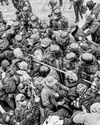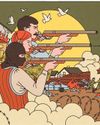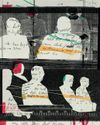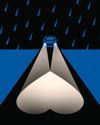
An extended family, maybe—he didn’t know. He tried to see if one of the adults was carrying a baby or if there was a toddler—a padded lump—plonked on the sand.
He didn’t want to walk over, down from the path, across the sand and stones, to the buggy. It was facing the sea. If the people up the beach had been nearer to it, he’d have known that it was theirs. He’d have known that they’d parked the buggy there at the edge of the sea so the baby would drink in the air—the ozone, whatever it was—and sleep, and stay asleep for a while. But it stood out, alone. There wasn’t an adult or a sibling, a towel or a bucket, anywhere near it. It made no sense.
It was more than likely empty. That didn’t make much sense, either, a buggy abandoned on the beach like that. But he remembered abandoning a buggy himself, years ago—it would have been more than thirty years—when the frame had buckled as he was pushing it up the hill in that place in France they’d gone to on their way to the ferry in Le Havre. Mont-Saint-Michel. A spectacular place, dripping with history and religion, but all he remembered about it was the ache in his arms, and the heat, as he pushed the buggy and the toddler in it up the incline, and the metallic screech as the frame—the sides— surrendered and the toddler seemed to disappear, as if she had been eaten by the buggy. The toddler, Gráinne, was fine—she had a toddler of her own these days—but the buggy wasn’t savable. No amount of bending or hammering would have coaxed it back into shape. They’d left it beside a bin and passed three more buggies, buckled and discarded, on their way back down to the car park.
This story is from the June 24, 2024 edition of The New Yorker.
Start your 7-day Magzter GOLD free trial to access thousands of curated premium stories, and 9,000+ magazines and newspapers.
Already a subscriber ? Sign In
This story is from the June 24, 2024 edition of The New Yorker.
Start your 7-day Magzter GOLD free trial to access thousands of curated premium stories, and 9,000+ magazines and newspapers.
Already a subscriber? Sign In

GET IT TOGETHER
In the beginning was the mob, and the mob was bad. In Gibbon’s 1776 “Decline and Fall of the Roman Empire,” the Roman mob makes regular appearances, usually at the instigation of a demagogue, loudly demanding to be placated with free food and entertainment (“bread and circuses”), and, though they don’t get to rule, they sometimes get to choose who will.

GAINING CONTROL
The frenemies who fought to bring contraception to this country.

REBELS WITH A CAUSE
In the new FX/Hulu series “Say Nothing,” life as an armed revolutionary during the Troubles has—at least at first—an air of glamour.

AGAINST THE CURRENT
\"Give Me Carmelita Tropicana!,\" at Soho Rep, and \"Gatz,\" at the Public.

METAMORPHOSIS
The director Marielle Heller explores the feral side of child rearing.

THE BIG SPIN
A district attorney's office investigates how its prosecutors picked death-penalty juries.

THIS ELECTION JUST PROVES WHAT I ALREADY BELIEVED
I hate to say I told you so, but here we are. Kamala Harris’s loss will go down in history as a catastrophe that could have easily been avoided if more people had thought whatever I happen to think.

HOLD YOUR TONGUE
Can the world's most populous country protect its languages?

A LONG WAY HOME
Ordinarily, I hate staying at someone's house, but when Hugh and I visited his friend Mary in Maine we had no other choice.

YULE RULES
“Christmas Eve in Miller’s Point.”